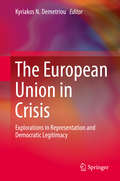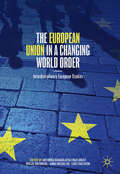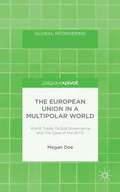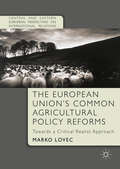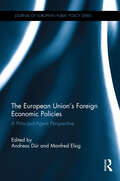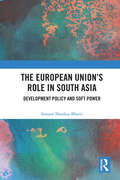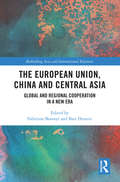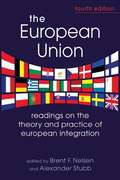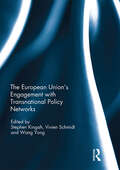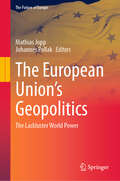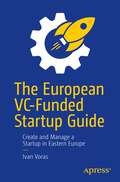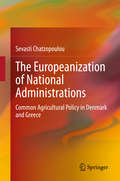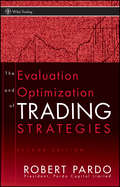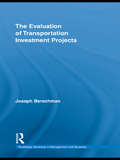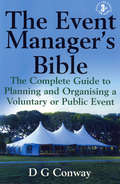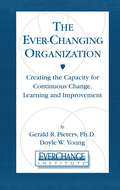- Table View
- List View
The European Union as a Global Actor: Trade, Finance and Climate Policy (Springer Texts in Political Science and International Relations)
by Susanne Lütz Tobias Leeg Daniel Otto Vincent Woyames DreherThis book focuses on the European Union as an important actor in international relations and international political economy. The EU negotiates international economic agreements, represents Europe in international organizations, and is a major trading bloc and currency area. To what extent and under what conditions the EU can use its considerable economic power to assert its interests in the international arena is a relevant question for students, researchers and practitioners alike. To explore this question, the textbook introduces the concept of “actorness” and presents an overview of the actorness debate and theories used to explain actorness. In addition, it includes three empirical chapters on trade, finance and climate policy that apply various concepts and theories to study European actorness in the respective policy areas.
The European Union in Crisis
by Kyriakos N. DemetriouThis volume is a comprehensive and rigorous exploration of intertwined issues surrounding the EU's democracy and legitimacy, written in the turbulent context of the financial crisis. The chapters are woven together under four interconnected thematic sections that examine: rapidly growing national euroscepticism; the Economic Monetary Union and its legitimacy; the future of EU integration; and democratic deficit(s) across its internal & external structure. The volume presents an authoritative collection of research results and surveys by experts in various disciplines related to the EU, and is addressed to researchers and students examining EU governance, representation and accountability, as well as practitioners across a multiplicity of fields.
The European Union in International Climate Change Negotiations (Routledge Studies in Environmental Policy)
by Stavros AfionisThe EU has been portrayed as a leader in international climate change negotiations. Its role in the development of the climate change regime, as well as the adoption of novel policy instruments such as the EU Emissions Trading Scheme in 2005, are frequently put forward as indicative of a determination to push the international climate agenda forward. However, there are numerous instances where the EU has failed to achieve its climate change objectives (e.g. the 2009 Copenhagen Conference of the Parties). It is therefore important to examine the reasons behind these failures. This book explores in detail the involvement of the EU in international climate talks from the late 1980s to the present, focusing in particular on the negotiations leading up to Copenhagen. This conference witnessed the demise of the top-down approach in climate change policy and dealt a serious blow to the EU’s leadership ambitions. This book explores the extent to which negotiation theory could help with better comprehending the obstacles that prevented the EU from getting more out of the climate negotiation process. It is argued that looking at the role played by problematic strategic planning could prove highly instructive in light of the Paris Agreement. This broad historical perspective of the EU’s negotiations in international climate policy is an important resource to scholars of environmental and European politics, policy, law and governance.
The European Union in a Changing World Order: Interdisciplinary European Studies
by Lars Oxelheim Anna Michalski Antonina Bakardjieva Engelbrekt Niklas BrembergThis book explores how the European Union responds to the ongoing challenges to the liberal international order. These challenges arise both within the EU itself and beyond its borders, and put into question the values of free trade and liberal democracy. The book’s interdisciplinary approach brings together scholars from economics, law, and political science to provide a comprehensive analysis of how shifts in the international order affect the global position of the EU in dimensions such as foreign and security policy, trade, migration, populism, rule of law, and climate change. All chapters include policy recommendations which make the book particularly useful for decision makers and policy advisors, besides researchers and students, as well as for anyone interested in the future of the EU.
The European Union in a Multipolar World: World Trade, Global Governance and the Case of the WTO
by Megan DeePresenting a critical overview of what 'emerging multipolarity' means for the world's foremost global trading bloc and economic power, the European Union, this book offers new insights into how the rise of the emerging economies has impacted the EU and its role within the World Trade Organization.
The European Union's Common Agricultural Policy Reforms
by Marko LovecThis book engages in thecontroversies of the European Union's Common Agricultural Policy (CAP) reforms,demonstrating how these are reiterated by mainstream theoretical approaches inthe field. The reforms that the EuropeanUnion's CAP underwent during the last threedecades were intended to make it less trade-distorting, more taxpayer-friendlyand more able to meet the new challenges of environmental concerns and ruraldevelopment/territorial cohesion. The outcome of the reforms has, however,contradicted these objectives, with the controversies being reiterated by themainstream theoretical approaches in the field. European Union's Common Agricultural Policy Reforms arguesthat these controversies are due to reductionist, rationalist and idealistassumptions with regard to the object of inquiry applied by mainstreamapproaches. It proposes an alternative critical approach that takes intoaccount the role of real material factors. Critical realism is not just analternative explanation of CAP reforms but an alternative theory of howexplanations can be made, which enables readers to reflect upon and endorse theresults of existing lines of research in proceeding towards deeper leveltheory.
The European Union's Foreign Economic Policies: A Principal-Agent Perspective (ISSN)
by Manfred Elsig Andreas DürThe European Union is a key actor in international economic governance. Through its foreign economic policies it plays a central role in the negotiation of international trade agreements, the global regulation of the financial services sector, and the provision of aid to developing countries. This book shows how principal-agent theory can be used to shed new light on this complex of policy areas. In particular, the contributions to this volume analyze delegation, control, and agent strategies in a variety of principal-agent relationships shaping the EU’s foreign economic policies: mainly those involving interest groups and governments; governments and the European Commission; and the European Union and international organizations.The chapters, written by leading experts in the field, offer empirically-rich studies of various areas of the EU’s external economic relations including trade, financial regulation, accounting standards and global regulation through the G7/G8. The book is aimed at researchers and advanced students interested in the EU, international economic relations, and principal-agent theory.This book was published as a special issue of the Journal of European Public Policy.
The European Union's Role in South Asia: Development Policy and Soft Power
by Simant Shankar BhartiThis book delineates the role and evolution of the European Union (EU) as an instrument of soft power in relation to South Asian countries. It explains the EU’s development policy towards South Asia and examines its cooperation while attempting to assess the extent to which EU’s development policy can be an instrument of soft power.In addition to examining the development challenges in South Asian countries and the impact of the EU’s development assistance on them, this book describes the various theoretical approaches on the concept of development, along with the interplay of aid politics in international relations (IR). Primarily, it assesses how the EU’s development policy emerged as a significant instrument of power towards developing countries.This book will be useful to students, scholars, and researchers of development studies, political science, sociology, economics, foreign policy, diplomacy, area and regional studies, South Asian studies, EU politics and European integration, international relations, and public administration. It will also be an indispensable companion for EU policymakers, NGOs and civil societies, South Asian states’ policymakers, and general readers interested in learning more about development diplomacy and soft power.
The European Union, China and Central Asia: Global and Regional Cooperation in A New Era (Rethinking Asia and International Relations)
by Fabienne Bossuyt and Bart DesseinThis book examines the involvement of the European Union (EU) and China in Central Asia and critically assesses the implications this has for the region as a whole. The volume adopts a comprehensive, interdisciplinary approach, combining insights from International Relations, EU Studies, International Economics, International Law, Sinology, and History. It concentrates on three thematic levels: (1) historical and contextual, (2) geopolitical and geo-economic, and (3) socio-cultural and institutional. Paying particular attention to the role of the EU and the factors driving the EU’s and China’s relations with Central Asia, it looks at how the Central Asian countries position themselves vis-à-vis China’s growing influence, and how the balance of power between China, Russia and the EU plays out. Contributors also explore the important historical context of the ‘Silk Routes’, as well as of the erstwhile connection of the Central Asian states with the Soviet Union. Critically analyzing the potential areas for collaboration and synergy between the EU and China, the book also discusses the extent to which they share a common ground in Central Asia that could serve as a basis for long-term cooperation. It will be of interest to all scholars and students of International Relations, Economics, Sinology, and History.
The European Union: Readings on the Theory and Practice of European Integration (Fourth Edition)
by Brent F. Nelsen Alexander StubbThe fourth edition of this popular reader, thoroughly updated, introduces students to both the concept of a united Europe and to integration theory.The expanded first two sections of the book now present the visions of the primary shapers of the union and its fundamental documents, as well as early currents in integration theory. The completely revised third and fourth sections explore recent theoretical developments in theory and practice as the EU wrestles with economic crises, political unrest, cultural conflict, and international competition.
The European Union’s Engagement with Transnational Policy Networks
by Stephen Kingah Vivien Schmidt Wang YongThis book is the first of its kind to paint a comprehensive picture of the manner in which the European Union (the EU) interacts with transnational policy networks (TPNs). The TPNs covered are those in a variety of fields including: conflict-prone natural resources, health, energy security, migration, human trafficking, combating of terrorism financing and climate change. The chapters are developed around six main lines of inquiry. The lines of inquiry articulated are: modalities through which the EU influences TPNs around the world, TPNs’ influence of policy and decision-making within the EU, conditions under which engagement between the TPNs and the EU may be regarded as successful, the identity and location of the TPNs and finally the added value or futility of a strategy developed in Brussels to weaken or fortify interactions with the networks studied. The importance of TPNs should be approached from the angle of the heightened attention now placed on informal modes of decision making. Increasingly there is a sense that many international decisions are adopted and internalized through networks that can be efficient yet wanting in transparency. The book unveils complex debates on the inter-phase between inter-governmental / supranational entities like the EU, on the one hand, and networks, on the other. The physiognomy of this inter-phase matters not only for the EU but also for other such inter-governmental/ supranational bodies as well as networks. This book was previously published as a special issue of Contemporary Politics.
The European Union’s Geopolitics: The Lackluster World Power (The Future of Europe)
by Johannes Pollak Mathias JoppThe book deals with the urgent need for the EU to position itself globally in the wake of Brexit, a rapidly worsening climate crisis, the COVID-19 pandemic, an aggressive Russia, and an ever more assertive China. After 60 years of intensive navel gazing that focused on institutional design more than world politics, the EU is now forced to defend its liberal democratic values, which have come under attack from inside and outside the European integration project. Moreover, Realpolitik is back on the agenda. Europe’s content negligence of defense matters in the past few decades has been revealed by Russia’s war of aggression against Ukraine.
The European VC-Funded Startup Guide: Create and Manage a Startup in Eastern Europe
by Ivan VorasExplore the startup landscape of East European countries and review the differences in the concepts of limited liability companies and company equity in approaching the market. This quick reference guide is structured around the primary author, Ivan Voras, with additional chapters written by guest collaborators. Chapters are concise and focus on ways to overcome the various obstacles start-ups may face. You'll benefit from regionally relevant advice on finding problems worth solving as a startup, how to hire people, how to raise investment rounds, and how to find and communicate with investors. Eastern Europe has become a region of fast growth after years of mismanagement and stagnation, and it has become the origin of promising startups. The last couple of years have also seen the rise in the number of local VCs who are attempting to address this market, as well as local incubators and accelerators. But there’s a problem: the vast majority of educational material available in books and online are written from the perspective of the US market and economy, and are not directly applicable in the complicated nuances of Eastern Europe. The European VC-Funded Startup Guide does not pull punches to highlight the difficulties involved in starting up from this region, but also provides workarounds and advice on how you can overcome them. What You'll LearnCreate and manage an early stage startup in East European countriesRun a young company, hire initial people, and raise investmentsUnderstand venture capitalist funds, which ones to avoid, and what to do with the early investment once you get itWho This Book is ForNovice startup founders in East European countries or more experienced professionals, such as investors and lawyers, interested in the startups in this part of the world.
The Europeanization of Domestic Legislatures
by Thomas König Olivier Costa Sylvain BrouardIn ten years 80 per cent of the legislation related to economics, maybe also to taxes and social aff airs, will be of Community origin." This declaration has been largely quoted, paraphrased and deformed by different authors, creating a persistent myth according to which 80% of the legislative activity of the national legislatures would soon be reduced to the simple transposition of European norms". This book addresses the topic of the scope and impact of Europeanization on national legislation, as a part of the Europeanization debate which raises normative concerns linked to the "democratic deficit" debate. The state of the art shows that there are many assumptions and claims on how European integration may affect national legislation and, more generally, domestic governance but that there is a lack of solid and comparative data to test them. The aim of the book is to give a solid and comparative insight into Europeanization focusing on effective outcomes in a systematic way. This book analyzes the period 1986-2008 and includes an introduction, a global overview of European legislative activities which set the background for Europeanization of national legislatures, 9 country contributions (8 EU member states + Switzerland) including systematic, comparative and standardized data, tables and figures, and a conclusion with a comparative analysis of the European and domestic reasons for Europeanization. All national contributions conclude that Europeanization of national legislation is much more limited than assumed in the literature and public debate. It is limited to 10 to 30% of laws (depending on the country), far less than the 80% predicted by Jacques Delors and mentioned daily by medias and public opinion leaders to demonstrate EU domination on member states. Beside that general statement, the various chapters propose a deep insight on EU constraint over national legislation, providing much information on the kind of laws and policies that are Europeanized, the evolution of this process through time, the impact of Europeanization on the balance of powers and the relations between majority and opposition at national level, the strategies developed by national institutions in that context, and many other issues, making the book of interest to academics and policy-makers concerned with Europeanization and national legislation.
The Europeanization of National Administrations: Common Agricultural Policy in Denmark and Greece
by Sevasti ChatzopoulouDrawing on comparative politics and social network analysis, this book examines how the domestic institutional and organizational settings, as well as the network governance patterns, determine variation in administrative responses to EU’s Common Agricultural Policy (CAP) in two European Union (EU) member states, Denmark and Greece. These two small member states represent the North and South dimensions of the EU. The north-south dimension in relation to administrative structures, respond differently to EU common policies―and to Common Agricultural Policy, specifically―which has not been studied in the Europeanization literature. Even though, the study of administrative responses to EU common policies is important as it has been especially noticeable during the current financial crisis. Europeanisation studies concentrate on either large Western European states (France, Germany and UK) or small Western Northern states. These studies produced detailed knowledge on specific countries and policy areas but they ignored the agricultural policy area and the importance of small Southern member states. By comparing a small Southern with a small Northern state since the accession to the EU, this book aims to fill this gap in the literature. Moreover, by linking the findings of the two cases to the member states that joined the EU in the 2004 fifth enlargement, and in other policy areas, it allows a better understanding of similar responses, either adaptation or inertia."This book represents an important contribution to the theoretical and empirical literature on Europeanisation and the Common Agricultural Policy (CAP). It systematically tackles an under studied question: does Europeanisation of policies lead to administrative change and convergence among the member states? The domestic administration of the EU CAP has remained domestically designed and monitored, resulting in divergence among the member states and gaps and imbalances in the performance of EU CAP decisions. The CAP is of more general interest because it combines regulatory and market intervention policy instruments. The analysis proceeds through in depth comparative historical case studies of Denmark and Greece which uses a sophisticated combination of quantitative and qualitative methodologies. The authoritative and informative analysis is structured by a focus on three key domestic factors. There is differentiated administration of common policies and while administration succeeds and adapts in one state, it does not necessarily do so in others, leading to differences in implementation performance. This book should provide a stimulus for further research." ―Wyn Grant, University of WarwickThe last 40 years have been crucial for the European agriculture. The Common Agricultural Policy fulfilled its primary objective, which led Europeans to shift its objectives and cope with the shortcomings created by the success of the Policy itself―manage surpluses and narrow the gap between farmers, due to price mechanism―as well as, adapt the policy following the successive enlargements and follow the developments in the global economy, in which we live nowadays. Dr. Chatzopoulou gives us a very accurate image on how differently actors of the agricultural economy, farmers, cooperatives and the administrations both in Greece and Denmark, behave. But also, how different is the structure of the sector in these two countries: in Denmark, almost everything is based upon a consensus, where there does not exist a law on cooperatives, and where the administration and the sector work together to adapt or to influence the decisions to take at European level. On the other hand, in Greece, farmers struggle to make their voice heard in the absence of professional organizations, the cooperatives are bound to work in the framework of a specific and strict law and the administration was not shown very cooperative with the sector. These two realities are very well illustrated by the author and many lessons are to be learnt thr
The Europeanization of Workplace Pensions
by Aptara. Inc Alexandra HennessyAlexandra Hennessy examines an area of Europeanization that has been largely ignored by political analysts: the development of an internal market for workplace pensions. This book offers an analysis of what is at stake in workplace pension reforms, tracing how different states approached them and how national political economy models have shaped actors' bargaining strategy at the EU level. Employing statistical analysis, formal modelling, and in-depth case study research, Hennessy highlights the role of informal signalling and communication processes in designing a common pension market. This book offers a theoretical framework that accounts for historical institutionalism, informal signalling processes and discourse in the Europeanization of workplace pensions – a must-read for students of comparative social and public policy, comparative politics and European politics.
The Eurozone Crisis
by Kaarlo Tuori Klaus TuoriTopical and timely, this book offers an economically informed constitutional analysis on European responses to the crisis. It discusses the longer-term proposals on the table including rescue measures and stability mechanisms, as well as the tightening of European economic governance. The authors see the European constitution as a multidimensional and multi-temporal process of constitutionalisation. They examine how the crisis has catapulted the economic constitution back to the 'pacemaker' position from where it determines developments in the political and social dimensions. However, now the key role is not played by the constitution of 'microeconomics', focusing on free movement and competition law, but the constitution of 'macroeconomics', introduced in Maastricht.
The Eurozone Crisis And The Future Of Europe
by Daniel Dăianu Giorgio Basevi Carlo D’adda Rajeesh KumarThe authors uncover the roots of the eurozone crisis, focusing on how this can be solved against the backdrop of a very deep financial and economic crisis and its strong social impact. Looking at the impact of the financial crisis on the eurozone, they explore the European Union's recent and future developments.
The Evaluation and Optimization of Trading Strategies
by Robert PardoA newly expanded and updated edition of the trading classic, Design, Testing, and Optimization of Trading Systems Trading systems expert Robert Pardo is back, and in The Evaluation and Optimization of Trading Strategies, a thoroughly revised and updated edition of his classic text Design, Testing, and Optimization of Trading Systems, he reveals how he has perfected the programming and testing of trading systems using a successful battery of his own time-proven techniques. With this book, Pardo delivers important information to readers, from the design of workable trading strategies to measuring issues like profit and risk. Written in a straightforward and accessible style, this detailed guide presents traders with a way to develop and verify their trading strategy no matter what form they are currently using-stochastics, moving averages, chart patterns, RSI, or breakout methods. Whether a trader is seeking to enhance their profit or just getting started in testing, The Evaluation and Optimization of Trading Strategies offers practical instruction and expert advice on the development, evaluation, and application of winning mechanical trading systems.
The Evaluation of Transportation Investment Projects (Routledge Advances in Management and Business Studies)
by Joseph BerechmanThroughout the world, the use of some kind of a formal transportation project evaluation procedure is a requirement. Yet, by and large, these are partial; in fact, much weight is often placed on the initial -pre-engineering -phases of the planning process, when vital information, such as accurate costs and demand projections, is largely missing. Moreover, many of these procedures neglect to consider key issues such as project’s risks, capital costs financing, latent demand, market imperfections, labor force availability and various incompatibilities between trip rates, travel times and activity location. As a result, projects, which are judged as viable under such deficient evaluation schemes, may have had a significantly different projection of capital costs and demand should a well-founded, thorough, and efficient evaluation process be used. Against this background, this book’s main objective is to construct a comprehensive and methodical economic, planning and decision-making framework for the evaluation of proposed transportation infrastructure investment projects. Such a framework is founded on four key principles. It is based on well-established economic, transportation and policy-analysis theoretical principles; it is comprehensive enough to encompass all relevant evaluation issues; it is applicable to a wide range of transportation investment projects; and it is amenable to empirical application including a sensitivity analysis and alternative scenarios regarding urban, regional and national developments.
The Event Manager's Bible 3rd Edition: The Complete Guide to Planning and Organising a Voluntary or Public Event
by D.G. ConwayAnyone responsible for organising a voluntary or public event will want to do it safely and well, complying with the legislation relating to different aspects of their event. This book will help you to research, plan, organise, manage and deliver any event, match, show, tournament or function that will be attended by more than a handful of people. You may be running a gymkhana, fete, fun run, steam fayre, half marathon, carnival, school sports day, jumble sale, tennis tournament, car boot sale, model aircraft show or even a huge pop festival or Formula 1 car race. Whatever it is, the principles are the same. As event manager you will need to research, plan, liaise with authorities, obtain permissions and licences, comply with legal requirements and then deliver the event to the public.Contents: 1. Introduction; 2. The event manager; 3. The event objective; 4. Planning the event; 5. Health & safety; 6. Type of event; 7. When to run the event; 8. Defining your target audience; 9. Audience size; 10. Advertising; 11. Event attractions; 12. Event requirements; 13. Accommodation and services; 14. Event site; 15. Traffic management; 16. Sign posting; 17. Permissions; 18. Car parking; 19. Radio communications; 20. Staffing; 21. First aid; 22. Security; 23. Insurance; 24. Emergency and normal procedures; 25. Formal presentation; 26. Event manager's manual; 27. Money; 28. Accounts; 29. Video diary/evidence; 30. Setting up; 31. Site maintenance; 32. Strip down/clear up; 33. Final debrief &; 34. Final report; 35. Conclusion; Annex A; Annex B; Index.
The Event Manager's Bible: The Complete Guide to Planning and Organising a Voluntary or Public Event
by D. G. ConwayAnyone responsible for organising a voluntary or public event will want to do it safely and well, complying with the legislation relating to different aspects of their event. This book will help you to research, plan, organise, manage and deliver any event, match, show, tournament or function that will be attended by more than a handful of people. You may be running a gymkhana, fete, fun run, steam fayre, half marathon, carnival, school sports day, jumble sale, tennis tournament, car boot sale, model aircraft show or even a huge pop festival or Formula 1 car race. Whatever it is, the principles are the same. As event manager you will need to research, plan, liaise with authorities, obtain permissions and licences, comply with legal requirements and then deliver the event to the public.Contents: 1. Introduction; 2. The event manager; 3. The event objective; 4. Planning the event; 5. Health & safety; 6. Type of event; 7. When to run the event; 8. Defining your target audience; 9. Audience size; 10. Advertising; 11. Event attractions; 12. Event requirements; 13. Accommodation and services; 14. Event site; 15. Traffic management; 16. Sign posting; 17. Permissions; 18. Car parking; 19. Radio communications; 20. Staffing; 21. First aid; 22. Security; 23. Insurance; 24. Emergency and normal procedures; 25. Formal presentation; 26. Event manager's manual; 27. Money; 28. Accounts; 29. Video diary/evidence; 30. Setting up; 31. Site maintenance; 32. Strip down/clear up; 33. Final debrief &; 34. Final report; 35. Conclusion; Annex A; Annex B; Index.
The Events and Trends that Have Shaped You: Who Is Generation Y, and What Does that Mean for Your Career?
by Tamara EricksonMany of our most powerful impressions are formed when we are teenagers. These impressions shape our assumptions not only about the world but also the role of work within it. As a generation, Gen Y's have been impacted by influential events like 9/11, and a technology environment that had most of them at computers since their earliest days. Also important are the cultural trends and family ties they grew up with, such as working mothers and a pro-child culture.
The Eventual Millionaire
by Dan Miller Jaime TardyBecome a millionaire by learning from millionairesAn Eventual Millionaire is someone who knows they will be a millionaire, eventually. But they want to do it on their own terms--with an enjoyable life and an enjoyable business. Eventual Millionaires are everywhere, from the airplane pilot looking to start his own business for more freedom and money to a student looking to start her life on the right foot to a successful business owner needing inspiration and wondering how to take her business to the next level.There are many ways to become a millionaire, but research has often shown that creating your own business is one of the best ways to build wealth. The Eventual Millionaire will lay the foundation for those looking to start their own business and work their way toward financial independence and a fulfilled life.Contains the insights of more than 100 millionaires and their various experiencesWritten by Jaime Tardy, founder of eventualmillionaire.com and a business coach for entrepreneursA companion website includes an "Eventual Millionaire Starter Kit" with worksheets, business plan documents, and much moreWe all want to be successful and enjoy financial security, but we might not know how or don't think we can do it. The Eventual Millionaire will show you what it takes.
The Ever Changing Organization: Creating the Capacity for Continuous Change, Learning, and Improvement
by Gerald R PietersIf you are: overwhelmed by the amount of change and the difficulty in making it happen, finding failure - or limited success - with the implementation of changes, disappointed in the growth or financial performance of your organization, and are looking for a strategy for improving your organization's capacity for planned and proactive change, this book is for you.The world is continuing to change at a rapid pace, while most organizations are focused on maintaining stability and certainty. The price of this growing gap is the diversion of limited resources to reactive, fire-fighting behaviors and the inability to lead and be proactive. Allowing the gap to continue to grow is the formula for failure, this book gives you the formula for success.In The EverChanging Organization, the authors present a model of the EverChanging Organization(ECO). This is a systems model for understanding an organization's needed capacity for change in a range of change orientations from change averse to change seeking. The book includes diagnostic scales, tools for assessing need and status as an ECO, and a process for selecting and implementing change initiatives to achieve the needed capacity for change in timely and cost effective ways.

